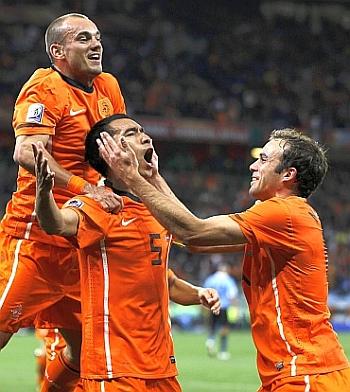Juicy orange attack too sharp for Uruguay
 The Dutch did not serve up a footballing master class on Tuesday but the tide of orange attackers still proved too much for Uruguay in the World Cup semi-final in Cape Town.
The Dutch did not serve up a footballing master class on Tuesday but the tide of orange attackers still proved too much for Uruguay in the World Cup semi-final in Cape Town.
The Netherlands ended South American participation at the tournament with a 3-2 win at the Green Point Stadium but had to hang on desperately in stoppage time at the end of the match as Uruguay kept up a determined attitude throughout.
The Dutch win was their 14th successive victory in a World Cup matches from the start of the preliminaries for the 2010 finals and underlines the quality they will take into Sunday's final at Soccer City in Johannesburg.
Playing with up to four attackers at times, they had too much quality, skill and guile for an under-strength Uruguay and deserved their success.
But it was not until just before the final quarter-hour that they were able to put some distance between themselves and their opponents and even then still found they needed some grim defending at the end to stymie a potentially miraculous comeback.
The 18th minute goal from Giovanni van Bronckhorst [ ] came after the Dutch took the early initiative but the brilliant long range strike served only to see them reduce the intensity of their approach and allow Uruguay to find space on the counter attack, especially on the right side of the Dutch defence.
Diego Forlan's [ ] 41st minute equaliser was as equally speculative but underlined how the sudden loss of tempo put Dutch supremacy at risk.
Coach Bert van Marwijk sought to regain the upper hand with the introduction of the more attacking Rafael van der Vaart into a central midfield role after half-time.
It meant the Dutch could conjure up opportunities with a veritable posse of attackers.
PERSISTENT PROBING
The persistent probing of Uruguay's defence eventually led to a breakthrough with Wesley Sneijder [ ] squeezing a shot through in the 70th minute followed soon after by an Arjen Robben [ ] header to make it 3-1.
That the Dutch put more goals past Uruguay in a single match than they had conceded in five previous matches at the finals in South Africa [ ], can also be attributed to the absence of injured Nicolas Lodeiro in defence and the suspension of Jorge Fucile, who had played major roles in a previously stingy back four.
Despite the tide of supporter sentiment against them, and having to cope with the running of Robben and the continual shifting of the ball by the Dutch, Uruguay still managed to set up a thrilling finale after Maximiliano Pereira pulled a goal back right at the end of the game.
In the end, as a chilly wind blew in over the stadium, the dominant Dutch were forced into some desperate tackling to keep intact their lead and ensure a place in the final for the first time since the last winter World Cup in Argentina 32 years ago

© Copyright 2010 Reuters Limited. All rights reserved. Republication or redistribution of Reuters content, including by framing or similar means, is expressly prohibited without the prior written consent of Reuters. Reuters shall not be liable for any errors or delays in the content, or for any actions taken in reliance thereon